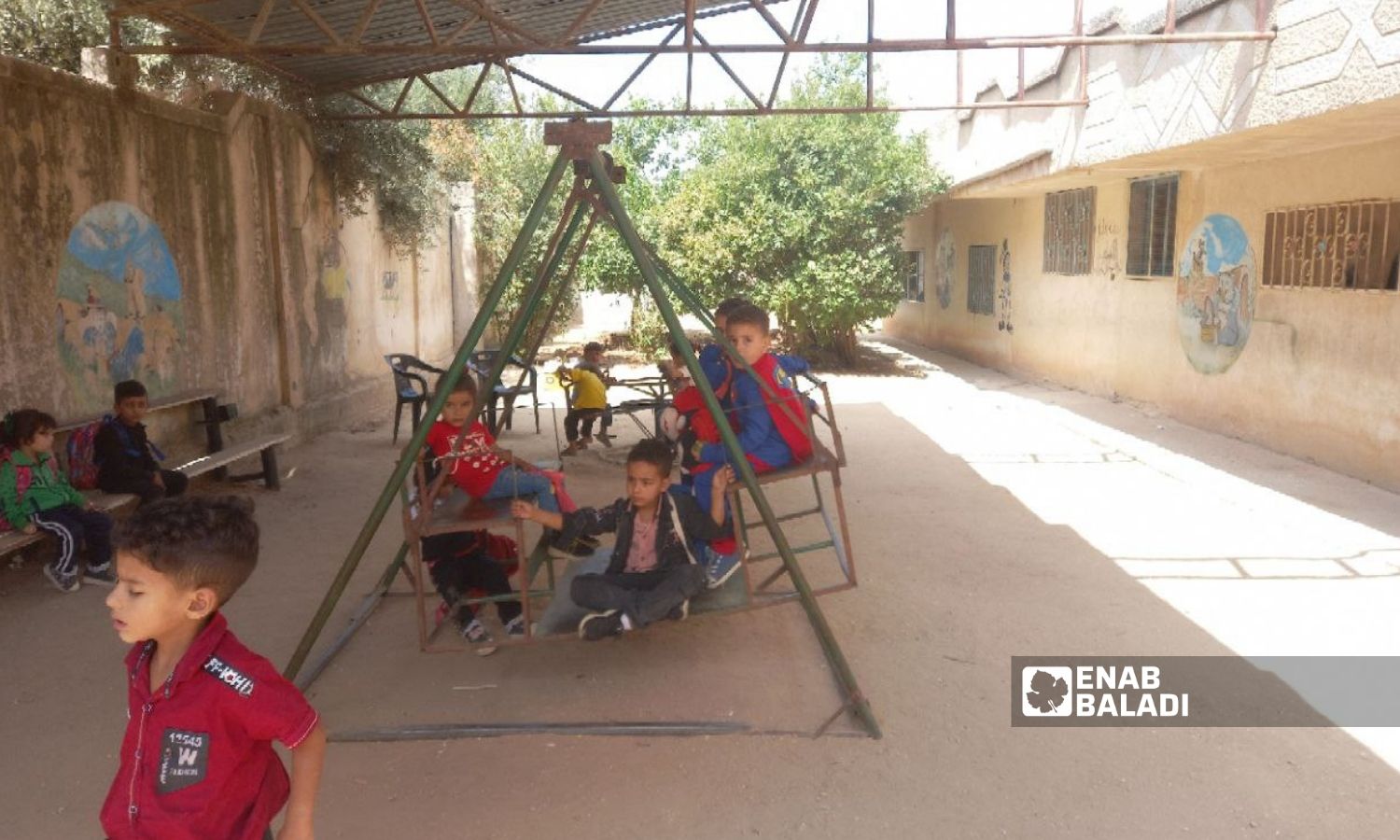



Daraa – Halim Muhammad
Islam al-Mohammed, a resident of the western countryside of Daraa, was unable to enroll her five-year-old daughter in kindergarten for the preparatory year for school.
Through al-Mohammed’s tour of the kindergartens in the towns of Tafas and Daraa al-Madina, she found that the annual installments for this year are no less than one million Syrian pounds during the school year, an amount that exceeds her financial ability.
The monthly income of al-Mohammed, who works in the sewing business, does not exceed 100,000 Syrian pounds (about 25 US dollars), which hindered her ability to enroll her child in kindergarten, as is the case with children of her age in the region.
The increase in kindergarten fees compared to previous years prompted Iman, 25, another woman from Daraa, to not enroll her son in a preparatory kindergarten.
Iman told Enab Baladi that she canceled the idea despite her conviction that her child was affected by her decision and despite her desire to prepare him psychologically and educationally because this would make him accept school and it would not be difficult for him,” according to her opinion.
Kindergartens have become limited to those who are financially able, and the first grade of primary school will be the first stop for low-income children, which may affect their level of mental comprehension and integration into school, Iman added.
There are many reasons behind the high financial premiums received by private kindergartens in Daraa, the most prominent of which is the increase in transportation fees, according to what Enab Baladi monitored.
One of the reasons for the high premiums is the rise in transportation fees, resulting from the high prices of diesel, as each kindergarten contracts with more than one bus dedicated to transporting children to and from their homes.
The price of a liter of diesel reached 6,300 SYP in the black market, which forced bus owners to ask for wages commensurate with this rise.
Eman al-Mohammed, a former teacher in a kindergarten in Daraa, told Enab Baladi that the prices of books and stationery offered by kindergartens have risen, which justifies the increase in their premiums.
In addition to the provision of meals by some kindergartens to children whose ingredients and availability vary according to the kindergarten and its contract with the children’s parents, she said.
Kindergartens, schools, or private educational institutions are not subject to clear control by the Daraa Education Directorate with regard to determining the financial premiums, as it is left to the contract between the beneficiary and the kindergarten management, which makes the value of the premium differ from one kindergarten to another.
Imad Hazeem, the education director in the regime’s Ministry of Education, said in an interview with the local al-Mashhad website early last June that the last increase in fees for private schools and kindergartens was approved by the Ministry of Education in the year 2020.
Hazeem added that the ministry has the right to reconsider the premiums in the event that laws are issued to raise workers’ wages or amend fuel prices.
Regarding the ministry’s monitoring of premiums, Hazeem said that the premiums value is optional and up to the agreement between the school or kindergarten administration and the student’s guardian, and the educational facility must notify the Ministry of Education of it, provided that there is no change in it during the year, he said.
According to Hazeem, educational institutions whose premiums increase on their own will be subject to a fine with the return of the sums collected from the parents, and the penalty may reach the cancellation of the facility’s license.
According to a study issued by the Harmoon Center for Contemporary Studies in 2020, the interest in children and the establishment of kindergartens in the Arab countries came later than most countries in the world.
Its beginnings were in 2000, including the children of the rich or middle classes, on the basis that the primary goal was an investment process rather than an educational one, which is completely different from the conditions and causes of its emergence in various countries of the world.
Pre-school kindergartens aim to prepare children, help them achieve various educational goals, and develop their abilities in the mental, physical, motor, emotional, social, and moral fields, according to the study.
It also aims to develop children’s language, arithmetic, and technical skills through individual and group activities and prepare the child for regular school life in the basic education stage through a gradual transition from the family atmosphere.
In contrast to many developed countries, kindergartens are considered a non-compulsory stage of education in Syria, as there are no official kindergartens, but most of them belong to the private sector or civil associations, or government institutions that are dedicated to the children of female workers only.
if you think the article contain wrong information or you have additional details Send Correction